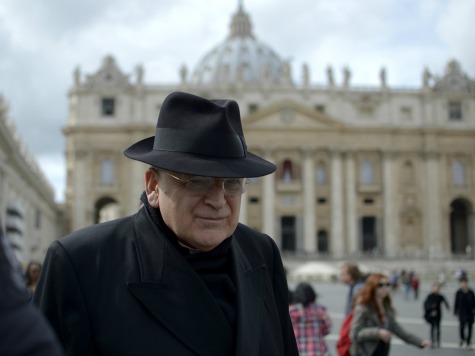“If the Church wishes to be clear in her teaching,” a change in ecclesial language “is neither possible nor desirable,” Cardinal Raymond Burke told Breitbart in an interview on Sunday.
Cardinal Burke, a canon lawyer, is the equivalent of the Chief Justice for the Vatican, and heads up the Church’s highest court.
Burke’s remarks came on the heels of a push from several bishops toward just such a change. The Vatican summit on marriage and family life, in which Cardinal Burke is participating, has witnessed a drive toward “gentler” language from Church leaders.
The bishops have said that certain expressions, such as “living in sin,” “intrinsically disordered,” and “contraceptive mentality” are offensive to people today and should be substituted for more pastoral expressions.
Burke criticized the use of euphemisms in moral discourse instead of calling things by their proper name. “Clear language is, in fact, charitable,” he said.
“I have always found this to be the case in my pastoral work,” he noted.
When a person reacts negatively to certain language like “living in sin,” the cardinal said, “it is a sign that he does not want to face the reality of his situation in life and wants the Church somehow to tell him that it is, after all, not problematic.”
The Cardinal also expressed his thought that the synod may be wasting too much time discussing “settled issues.”
Overemphasis on these settled questions, the Cardinal suggested, is taking precious time from more important topics that the synod fathers should be addressing, especially regarding how to help young people prepare for a lasting marriage.
Burke believes that “far greater attention” should be given to “the ways in which the Church can assist the faithful to know and to live the truth about marriage.”
I think, he said, “of the decades of vacuous or inadequate catechesis of children and youth,” which have left young people “with a completely inadequate or even false understanding of the vocation to marriage.”
“I also think that far greater attention needs to be given to the essential connection between the Sacred Liturgy and holiness of life in marriage and in the family,” he said.
The idea of admitting those in irregular unions to the sacraments or of simplifying the annulment process are topics “which should have been excluded from discussion from the beginning,” because they have already been thoroughly discussed in the past,” Burke said.
Burke noted that the question of admitting those in irregular unions to receive Holy Communion was discussed thoroughly in the 1980 Synod on the Family and received a response in Pope Saint John Paul II’s Apostolic Exhortation Familiaris Consortio. And regarding the annulment process, the Instruction Dignitas Connubii was published in 2005 after years of careful study.
Moreover, while motivated by good will, the push for easing the annulment process may display a worrisome ignorance.
“From the discussions in the Synod,” the Cardinal continued, “I fear that the nature itself of the process for the declaration of matrimonial nullity is not understood.”
“For many, it seems to be a tool to give individuals a ‘second chance’ to marry, instead of a judicial process to arrive at give a just judgment to a party or parties who contest a juridical fact, the nullity of a concrete marriage,” he said.
The Cardinal told Breitbart that the greatest obstacle facing the Vatican synod “is a false understanding of the relationship between faith and culture.”
“Not infrequently, in the discussions at the Synod, one has the impression that the faith must, in some way, accommodate itself to the totally secularized culture, instead of calling the culture to conversion,” he said.
The many problems facing modern couples has led bishops to the conclusion that “the Church cannot teach about marriage as she has always taught,” the Cardinal said.
But Burke disagrees. In fact, he proposes the opposite course.
Rather than soften the message, Burke insists, the gravity of the cultural decline “demands that the Church teach with ever greater clarity and insistence.”
Burke said that in his experience, “people of good will in our time welcome such a presentation of the faith and its practice.”
It is rumored that Pope Francis will soon be removing the 66-year-old Burke, a noted conservative, from his post as chief justice, and moving him to a largely ceremonial position as chaplain to the Sovereign Military Order of Malta.
Earlier this week, another senior Cardinal, who wished to remain anonymous, told Breitbart that he was disappointed at the idea that the Pope would remove Burke, who by all accounts is “a superb canon lawyer” and has carried out this position with professionalism and fidelity.


COMMENTS
Please let us know if you're having issues with commenting.